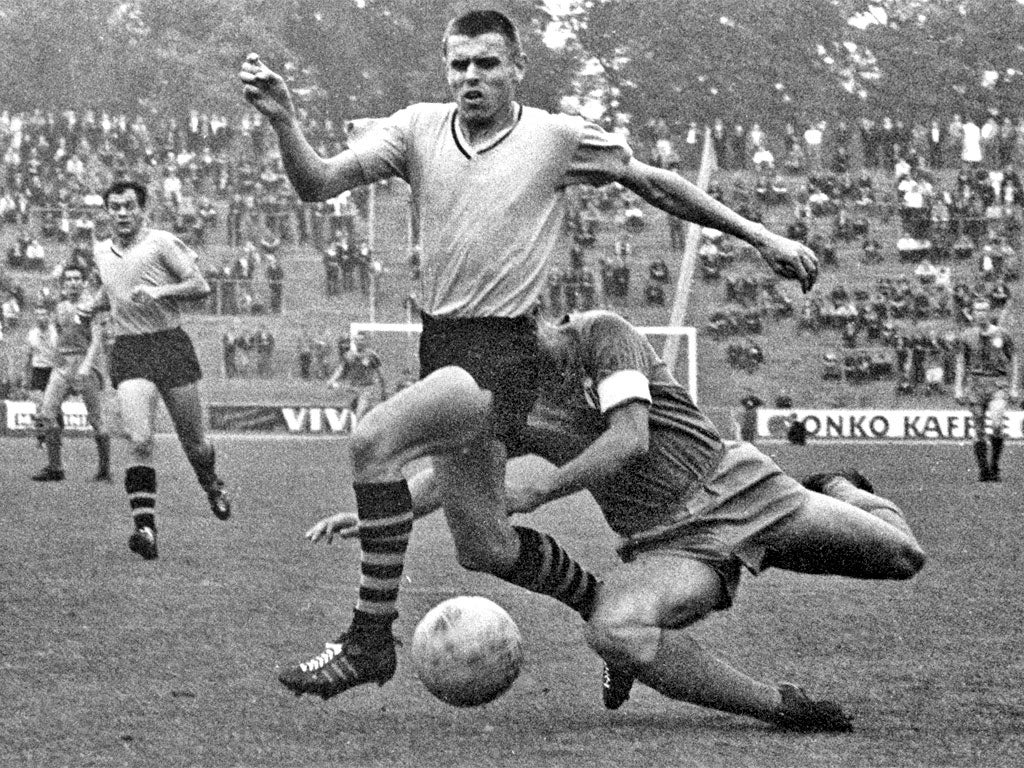Timo Konietzka: Footballer andeuthanasia advocate

On 24 August 1963, playing as a striker for Borussia Dortmund against Werder Bremen, Timo Konietzka scored the first goal of the match in the first minute. It was also the first goal in the newly formed German Bundesliga. Dortmund were one of 16 teams picked to form West Germany's first top-level league since the Second World War, and although Bremen won 3-2, Konietzka's goal was the one fans and commentators remember. He played for Borussia Dortmund from 196065, scoring 93 goals in 123 matches. Sadly, his historic goal was not captured on camera.
He was born Friedhelm Konietzka in Lünen, Westphalia, in the Ruhr industrial area. It was an expanding mining town of 46,000 and for five years after leaving school Friedhelm joined classmates and family members working in the mines. He began his football career at his hometown club, VfB 08 Lünen. Max Merkel, the legendary Dortmund coach, recognised Friedhelm's talent and gave him his chance.
Between 1962 and 1965 he played for the West German national side, where his scoring record has been bettered only by Gerd Müller, one of the heroes of the 1974 World Cup victory.
From 1965-67 Konietzka played for TSV 1980 Munich, scoring 30 goals in 47 matches. He was nicknamed "Timo" by his team-mate Helmut Bracht because, he said, Konietzka resembled Marshal Timoshenko with his short, razor-cut hair. Konietzka eventually changed his name, legally, to Timo.
PLaying against his former club in October 1966, Konietzka assaulted the referee in protest at an alleged handball by Dortmund's Siggi Held. The Bundesliga dealt harshly with him, banning him for an unprecedented six months – still a record to this day.
He became a controversial figure among the fans and, feeling he had been unfairly treated, he began to look for other opportunities and moved to Switzerland in 1957 to join FC Winterthur. He retired from playing in 1971, moving into coaching and winning three Swiss championships with FC Zürich from 1974-76, and one with Grasshoppers Zurich in 1982. He reached the European Cup semi-finals in 1977, when his FC Zurich side lost to Liverpool. As coach of Young Boys Bern he twice reached the final of the Swiss Cup in the late 1970s. He also coached at Borussia Dortmund, Bayer Uerdingen and Luzern.
Konietzka gained Swiss nationality in 1988. In his final years, with his wife Claudia, he ran a guest house in Brunnen, on Lake Vierwaldstättersee. He and his wife were very much part of the community, even being elected to be key figures in the local carnival. But Konietzka also kept up with friends and colleagues in Germany, and freelanced for the Swiss tabloid Blick.
Konietzka was a great believer in "mercy killing" and in 2010 went on television to support it, saying in an interview that he was planning his death. He had seen many people die, both during the wartime bombing of Lünen and elsewhere – and, he added, "My sister died of cancer, a brother died of bone cancer... My mother was in a care home, and no longer recognised me. I have thought it over." He did not want to be a "care case", holding on to an artificial life. "I'll spare myself that."
Former colleagues remembered him as a very down-to-earth personality, honest and kind. In February he was told he had a malignant tumour in his bile duct. With the help of Exit, the euthanasia organisation, he took his own life. In his death notice, which he wrote himself, he urged everyone to make the best of their lives: "Mine was long and yet so short". He had certainly lived up to his own ideal.
David Childs
Friedhelm (Timo) Konietzka, footballer: born Lünen, Germany 2 August 1938; married; died Brunnen, Switzerland 12 March 2012.
Join our commenting forum
Join thought-provoking conversations, follow other Independent readers and see their replies
Comments
Bookmark popover
Removed from bookmarks